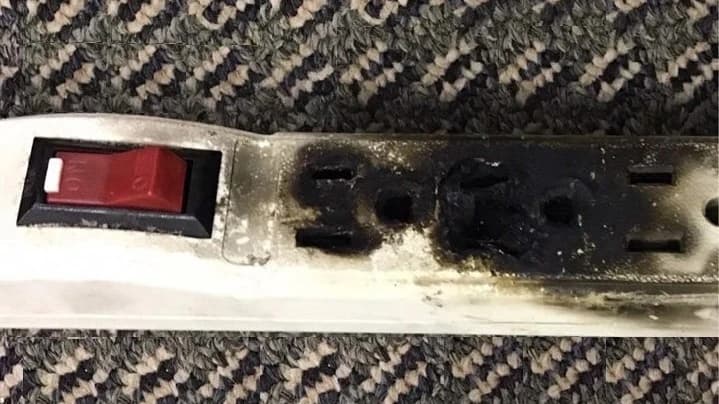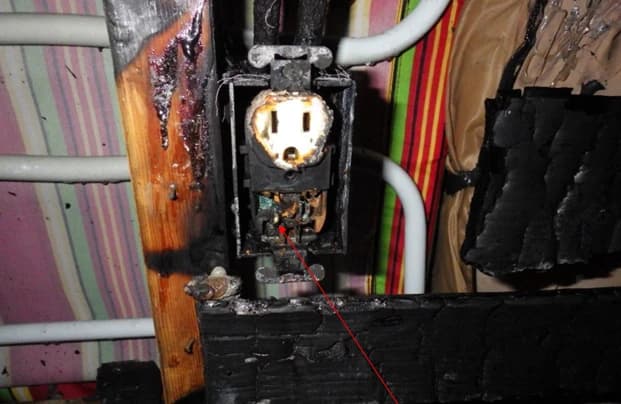Electrical Fire
Annual State of Safety 2024
Electrical Fire: A Common Hazard in BC
When an electrical cord won’t quite stretch all the way to the outlet, many of us won’t think twice about using an extension cord. You might attach it to a power bar or another extension cord in a dire circumstance, or run it under a rug, hoping that it will lessen your chances of tripping on it later. These small choices can seem innocuous at the time, but any of these choices could lead to a common household risk: an electrical fire.
Electrical fires are usually caused by uncertified or faulty electrical equipment, wiring, or components (like lithium-ion batteries) which can overheat, malfunction, or become damaged over time. When this happens, corroded or otherwise faulty equipment can ignite flammable material and cause a fire. Electrical fires are one of the top causes of house fires in Canada and, in 2024, they were identified as one of the top safety risks related to regulated equipment in British Columbia.
Electrical hazards often arise from seemingly harmless shortcuts, like relying on extension cords for long-term or permanent wiring, using uncertified electrical devices, running cords under rugs or through windows, or connecting power bars together. These practices increase the risk of electrical fires, which was unfortunately illustrated by some of the incidents our safety officers investigated in 2024.
Electrical Heater Torches RV
In one case in January 2024, a haphazard wiring modification used inside of a vacant recreational vehicle (RV) caused an electrical fire in Whistler. A portable heater had been plugged into a modified extension cord, where the original receptacle end was cut off and replaced with an aftermarket receptacle.

The line voltage conductor of the extension cord was not terminated correctly, resulting in repeated arcing. Arcing occurs when electricity jumps from one connection to another, at times producing a sizzling or crackling sound. Since the circuit breaker in the RV did not have arc-fault protection, the arcing ignited flammable material nearby and the fire spread throughout the RV, causing fire, heat, and smoke damage. Luckily, there were no injuries reported as the RV was vacant at the time of incident.
This incident could have been prevented if the RV owner had used an unmodified extension cord that had been certified for use in Canada. In May 2024, we released an information bulletin clarifying that electrical equipment must bear evidence of either a mark or a label of a certification agency accredited by the Standards Council of Canada, or an approval label issued by Technical Safety BC.

Improper Wiring Leads to Hot Tub Control Box Fire
In March 2024, another electrical fire broke out due to faulty wiring, this time inside a hot tub control box located at a private residence in Delta.
The hot tub had been installed at the residence and wired with a new aluminum armoured feeder cable. The hot tub was required to be connected with a minimum #6AWG copper conductors only and was not approved for use with aluminum conductors.
Over time, the connections with the aluminum conductors at the hot tub control box deteriorated and created high resistance connections. During use, the heat generated at the connections was sufficient to ignite the combustible enclosure for the electrical control box.
On the day of the incident, the main service breaker at the house tripped, resulting in a complete loss of power to the residence. The homeowner was able to restore power to the home after a few hours but noticed that the hot tub side cover was distorted and leaking water. The homeowner removed the hot tub side cover and discovered the electrical control box had been significantly burnt.
The cause of the incident was the use of incorrect conductors to supply power to the hot tub, contrary to manufacturer recommendations.
Electrical Safety Education and Outreach
We continue to address the causes of electrical fires in BC through multimedia public safety campaigns designed to educate the general public about possible hazards and best practices when interacting with electrical equipment.
Each year we run public safety campaigns centred on seasonal electrical safety tips and regularly host educational events for our clients on the most common electrical hazards and how to avoid them.
Despite this, due to the risks associated with using electrical shortcuts, specifically uncertified, faulty or incorrect wiring, and the use of unlicensed workers in homes across the province, we still see a need for education campaigns for both the public and our clients when it comes to safely performing regulated electrical work.
You Might Be Interested In
Building Confidence
Learn about our risks in focus. See how we’re improving the client experience and enforcing against those who work outside of the safety system.
Learn MoreSafety Engagement
We provide technical training and education to support our partners. We also work to influence people in the safety system to make safety-minded decisions.
Learn MoreData and Trends
Find key statistics on permits, incidents, injuries, assessments, and more.
Learn More